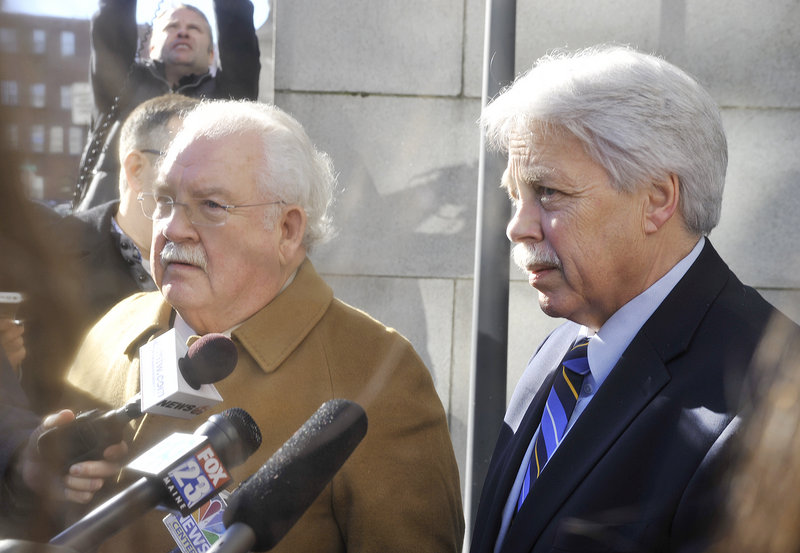ALFRED — A hearing in the Kennebunk prostitution case to decide whether the highly-anticipated trial of Mark Strong Sr. will happen now or in months to come is now underway in York County Superior Court. It began at 8:40 a.m.
Strong’s trial, the first since the prostitution scandal broke last year and quickly gained international attention, stalled out last week after the presiding judge took up a defense motion midway through the jury selection process and dismissed 46 of the 59 counts against Strong.
Prosecutors immediately filed an appeal of Justice Nancy Mills’ dismissal of the charges, potentially delaying the start of the trial until the appeal can be decided.
Tuesday morning’s hearing is on another motion by Strong’s attorney, Daniel Lilley, to split the case in two parts, the dismissed 46 counts under appeal and the remaining 13 pending counts. Lilley wants the trial to go ahead on the 13 pending counts.
Potential jurors in the case are under orders to call a jury hotline after 9:45 a.m. to find out when to report to court for jury selection to continue.
Strong, 57, of Thomaston, is accused of conspiring with Alexis Wright to run a one-woman prostitution business from her Zumba studio in Kennebunk, and of helping to make video recordings of her activities with customers.
The 46 dismissed counts against Strong were all charges of violation of privacy and conspiracy to violate the privacy of Wright’s prostitution customers for recording their encounters with Wright in her Zumba studio.
The case has drawn attention in part because Wright is suspected of keeping a meticulous list of more than 150 names of customers, including prominent figures. Sixty-six have been charged so far, and 18 have pleaded guilty to engaging a prostitute.
In dismissing the violation of privacy charges, Mills agreed with Lilley, who argued that people engaged in a criminal act cannot have an expectation of privacy. She ruled that the patrons who were committing a crime by paying for sex “may have had a subjective expectation of privacy, but I can’t find an objective expectation of privacy that society would be willing to expect.”
Wright, 30, of Wells, is scheduled to stand trial on 106 counts against her in May. She has pleaded not guilty to all counts, including promotion of prostitution, engaging in prostitution, violation of privacy, conspiracy, tax offenses and receiving welfare benefits when ineligible.
She faces 46 counts of violation of privacy, the same number as Strong did before Mills dismissed them. Wright’s attorney, Sarah Churchill, said Friday that she likely would have asked the judge to dismiss those charges against her client as well.
The lead prosecutor, York County Deputy District Attorney Justina McGettigan, requested a recess after the judge’s ruling and obtained permission for the state Attorney General’s Office to file an appeal.
McGettigan argued that Mills’ dismissal of the 46 counts poses a “serious impairment” to the prosecution of the case, giving legal grounds for the appeal.
The case was suspended until the Maine Supreme Judicial Court ruled.
Until the high court’s decision, signed by Chief Justice Leigh Saufley on behalf of the full court, the fate of the trial had been unclear. Her order puts the fate of the trial back in Mills’ hands, to decide how to go forward.
The judge had been conducting individual juror questioning, called voir dire, behind closed doors for three days last week before the state’s Supreme Judicial Court ordered the process stopped in response to an appeal filed by the Portland Press Herald challenging the judge’s move.
In a 6-1 decision, the state’s highest court ordered that voir dire must continue in open court.
The court never got that far. McGettigan’s appeal put jury selection in limbo, leaving the judge to release the jurors for the day Friday with instructions to call the hotline.
Since the jury selection has so far been conducted behind closed doors, the makeup of the jurors seated so far is a secret, including details on their ages, race or gender. Also not disclosed is how the lawyers for each side chose each juror, which ones they chose to excuse or how they have used their strikes to eliminate specific potential jurors.
By law, defense attorneys and prosecutors in the case each have four peremptory challenges, which allows them to strike a potential juror without giving a reason. Each side gets an additional peremptory challenge for every alternate juror beyond the 12 regular jury members
who are seated, up to the maximum number of four alternates.
Mills imposed a gag order at the start of jury selection, barring attorneys from talking about the selection. Lilley has flouted the order at times, but on Monday declined to comment on the case. He had said on Sunday that the jury selection process had been nearly complete when the case was suspended Friday, with only three jurors left to be seated.
Attorney Sigmund Schutz, who represented the Portland Press Herald in its effort to open the jury selection process, said he has filed for written transcripts of the closed-door sessions. The court has yet to create them.
Mills has described the media attention in the Kennebunk prostitution case as “unprecedented.” She said this is the first time in her 19 years as a judge that she has been unable to seat a jury for a trial in a single day.
Staff Writer Scott Dolan can be contacted at: 791-6304 or at: sdolan@mainetoday.com
Send questions/comments to the editors.




Comments are no longer available on this story